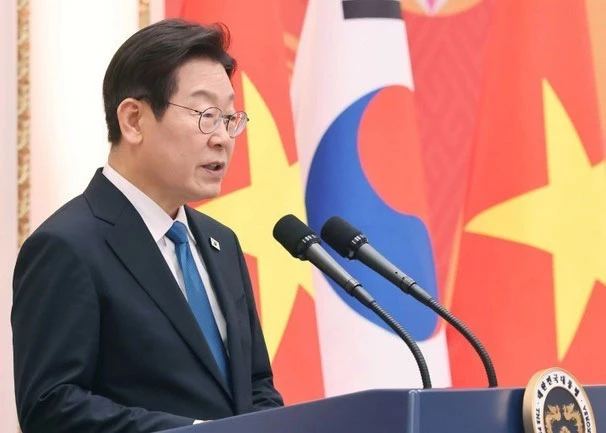President of the Republic of Korea to make important visit to Japan
President of the Republic of Korea (RoK) Lee Jae Myung will visit Japan and hold talks with Prime Minister Ishiba Shigeru, before travelling to the US to attend the RoK–US Summit on August 25.
 |
| President of the RoK Lee Jae Myung. (Photo: Thong Nhat/VNA) |
The visit reflects the Korean leader’s commitment to the RoK–Japan cooperation, while also sending a message to Washington about the stability of bilateral relations between the two Northeast Asian nations.
Ahead of his visit to Japan this weekend, in an interview at the Presidential Office in Seoul, President Lee Jae Myung emphasised that Japan is an extremely important partner, while expressing hope that Tokyo also values relations with the Republic of Korea.
Affirming that it is unnecessary to focus excessively on long-standing issues that have hindered bilateral ties, including matters related to Korean labourers working for Japanese companies during the Second World War, the Korean leader stressed that both Seoul and Tokyo need to make efforts to resolve problems without causing harm to either side.
More importantly, the RoK expressed its desire to strongly enhance economic, security, and people-to-people relations between the two countries.
President Lee Jae Myung’s remarks further reinforced political circles’ confidence in the positive outcomes expected from the upcoming visit to Japan — an event considered to be of great significance and consistent with the commitment to “pursue a stable relationship with Japan” that the Korean leader announced at the G7 Summit in Canada in June.
The Korean side also expressed hope that personal relations and trust between the Korean President and the Japanese Prime Minister would deepen, noting that the two leaders are expected to discuss measures to strengthen the RoK-Japan cooperation and trilateral relations between the RoK, the US, and Japan. In addition, regional peace and other global issues will also be considered.
From the Japanese side, the Office of Prime Minister Ishiba Shigeru also gave a positive assessment of the forthcoming meeting, stating that Japan and the RoK need to cooperate in responding to common challenges. In the current changing strategic context, the importance of bilateral as well as trilateral cooperation with the US is greater than ever.
For Prime Minister Ishiba Shigeru personally, the meeting with the Korean President is seen as an opportunity to demonstrate his diplomatic leadership and determination to overcome difficulties, following the failure in last month’s House of Councillors election. The restoration of Korea–Japan “shuttle diplomacy”, after the conclusion of tariff negotiations with the US, could bring additional public support for Prime Minister Ishiba Shigeru’s Cabinet.
In a move to bolster diplomatic efforts, the Korean Government has appointed two veteran diplomats as its next ambassadors to Japan and the US.
Former Ambassador Lee Hyuk has been designated as Ambassador to Japan. He traditionally has deep connections with Tokyo, having previously served as Korean Counsellor in Japan, Korean Ambassador to Viet Nam, and Director-General of the Asian and Pacific Affairs Bureau of the Ministry of Foreign Affairs.
Known as one of Korea’s “Japan experts”, the choice of Lee Hyuk is seen as a move aimed at bringing stability to bilateral relations.
Meanwhile, former Foreign Minister Kang Kyung Wha has been appointed as Korean Ambassador to the US. With the announcement that the Korean and Japanese leaders are expected to focus on strengthening cooperation and moving away from obstacles in bilateral relations, Seoul affirmed that both sides would consolidate the foundation for future-oriented cooperation and strengthen trilateral coordination with the US by holding frank discussions on regional peace, stability and global issues.
Notably, this is the first time a Korean president has visited and held talks with a Japanese prime minister immediately prior to attending a summit with the US. This is seen as reflecting Korea’s desire to work closely with Tokyo to “modernise the alliance” to address global crises.
The Korean President is still working to adjust and implement foreign policy after taking office more than two months ago. As one of the key trips to Japan and the US, the high-level Korea-Japan meeting is regarded as sending a message about stability in bilateral relations, dispelling Washington’s concerns over the alliance.
For Seoul, it is also an opportunity to reaffirm its important role in trilateral security cooperation, with the aim to maintain order and stability in the Indo-Pacific region.
NDO





READER COMMENTS